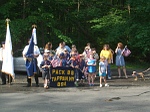At the Flagpole
On Memorial Day, Palisadians continued their time-honored tradition of gathering around the Flag Pole, once known as the Liberty Pole, to honor those fallen in war. Since the pole was erected in 1861 on a small triangle of land donated by Herbert Lawrence for that express purpose for all time, the Flag Pole has been the site of patriotic celebrations expressing the sentiments of our community.
In recent years, the Memorial Day ceremony has been organized by the John M. Perry Post of the American Legion, featuring speeches by veterans and non-veterans alike. This year, Palisades resident Eric Vorenkamp spoke the following words:
A few weeks ago, Alice Gerard walked over to me and asked — no actually she said, Eric you are a war veteran, then she asked—would you speak for a few minutes at the Memorial Day Celebration? I paused, squirmed, wondering how I could gracefully decline, but when I looked Alice in the eyes I realized I had as many options as I used to have when a Marine Corps Drill Instructor ASKED me to do something.
I understand that this is a solemn occasion and I understand that this is not Veterans Day. Nonetheless, I would like to offer some personal thoughts and remembrances about military service and about one man’s view of the nation’s response to the sacrifices men and women have made from the time of the Vietnam war and are still being asked to make as we stand here this morning.
Like many who returned from combat service in Vietnam, I was often asked, “Why did you go?” As I recall, I never heard that question from anyone in my parents’ generation, but often from my contemporaries.
Military service was something I grew up with. One of my first recollections of my father was seeing him at the Officers Club on Treasure Island next to Golden Gate Bridge in San Francisco. I was four or five years old but had not seen my father for the two and a half years he had been stationed in Alaska during the Korean War. He was wearing his dress blue uniform and he scooped me off the floor in a big bear hug.
I don’t remember a single war story—not one—from my maternal grandfather who served in the Army in World War I, nor from my paternal grandfather who served as a Navy Captain running convoys in the North Atlantic during World War I, nor from my father who served on a Navy Destroyer in World War II and, as I mentioned, in Alaska during the Korean War. Despite the lack of war stories, military service as attested to by photos of family men in uniform, a framed letter of commendation from James Forrestal, Secretary of the Navy, to my grandfather, officers’ swords displayed on the wall, was a constant presence in my life.
Thus in 1968, despite political unrest in the country, it seemed natural to enlist in the Marine Corps and serve in Vietnam. It was simply my time to serve my country in the tradition of my family.
For me, one of my most emotional memories is from 1975, and I suppose this goes back to the idea of service, when I was back home holding my five month old son asleep on my shoulder and watching the fall of Saigon on the nightly news.
Now my son has grown up, and he has in turn continued the family tradition, serving as a Navy pilot with the Battle Group Constellation in the Persian Gulf at the opening salvos of the Iraq war. His emails home, and those of his fellow warriors, were collected in the compendium, Operation Homecoming, by Andrew Carroll, published in 2006 with a grant from the National Endowment for the Arts.
Today, I ask that we remember not only those who have fallen but also those who are alive but severely wounded.
Several years ago I visited the Balboa Naval Hospital in San Diego. Seeing so many young Marines, just kids, most of them, with all imaginable and unimaginable scars and amputations was heartbreaking.
I heard from a very knowledgeable fellow that if it were not for Kevlar and the advances in field medicine, the death toll for American military in Iraq and Afghanistan would exceed the number in combat dead in Vietnam. True or not, the physical and mental suffering of survivors should be, in my judgment, a greater concern for the country than it often appears to be.
We need to remind ourselves of this issue. The civilian world that most of us live in is often far removed from the world of war and the sacrifice of many today – I remember a lawyer at work saying to me several years ago, “Eric, until I learned your son was in Iraq, I didn’t know anyone with any direct connection to the war.”
The arguments for a draft versus an all-volunteer military are complicated but in contrast to today, almost all Americans during the Vietnam war had a personal connection to someone who was serving.
Finally, let me acknowledge an important lesson I believe we did learn from Vietnam. Whether we agree or disagree with the war, let us honor those who serve and honor their sacrifice. are a war veteran,


